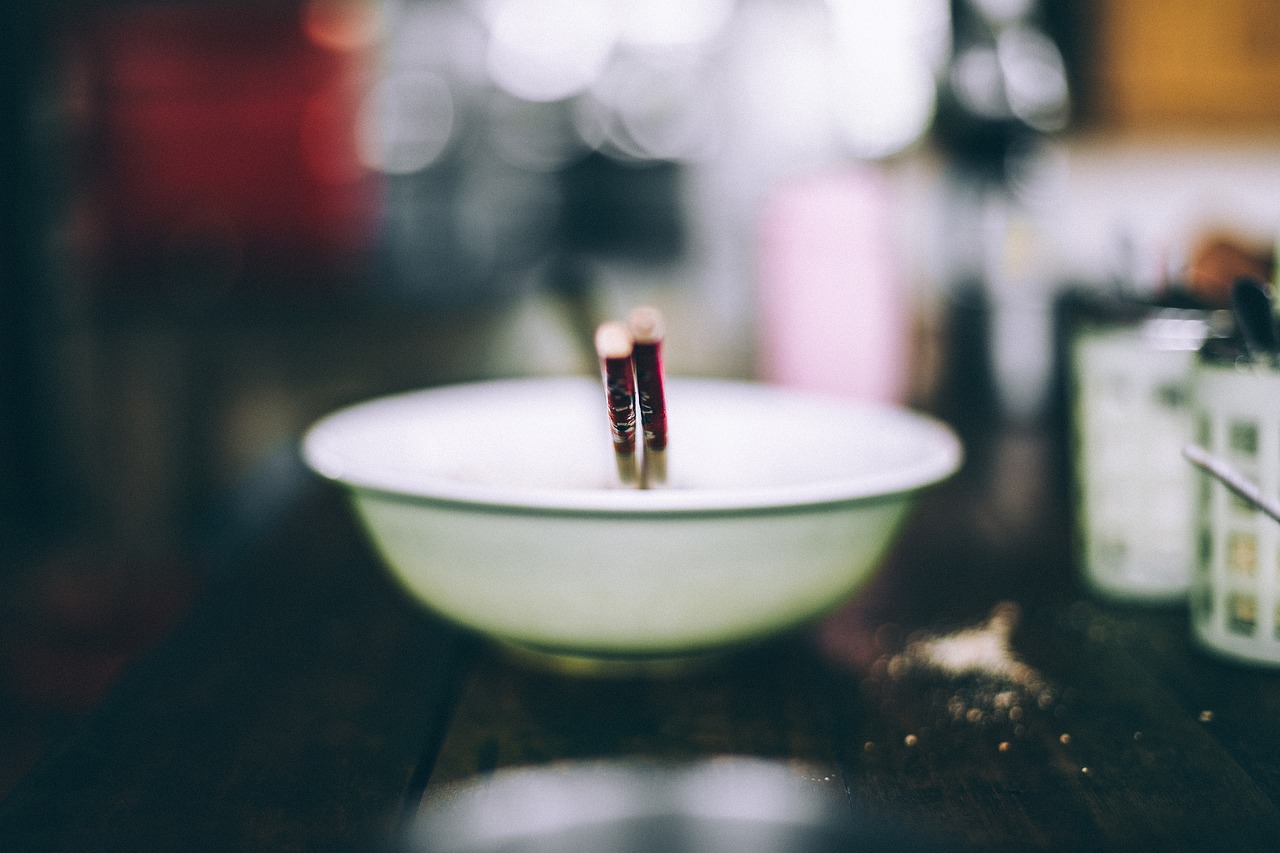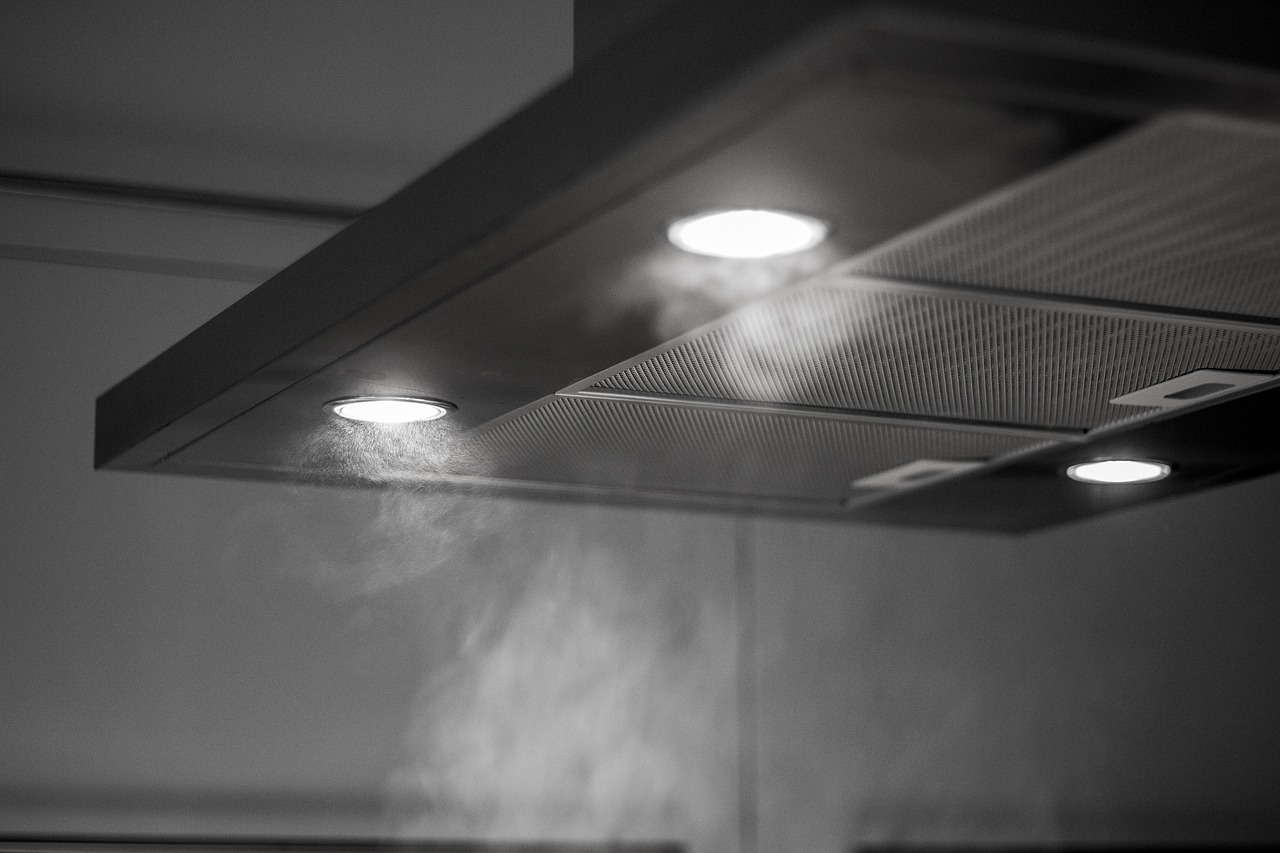Overview
Contact Attorney: David A. Neiman
Injury: Serious burns caused by instant soup products
Defendant: Maruchan, Inc. and Nissin Food Product Co., Ltd.
Practice: Personal Injury
Latest Update: December 2025 – Momentum grows in instant soup lawsuits across the country.
Lawsuits against instant soup manufacturers will soon be filed across the United States. Our team is assessing claims and gathering medical records, product data, and other information necessary to build strong cases for our clients.
Case Team
Principal Attorney: David A. Neiman
Principal Paralegal: Monica Raatz
Supporting Paralegal: Gabriela Lopez
Legal Assistant: Mantas Dumcius
Children Burned by Instant Soup: Lawsuit Alleges Dangerous Packaging to Blame
Instant noodle cups are a popular instant meal, especially for busy families—these soup cups are quick, cheap, and easy to prepare. However, lawsuits claim that the design of some soup packaging makes it more likely to tip over and seriously injure children with boiling water.
Scalds from instant noodle and instant soup cups are a common cause of serious burns in children age 4-12. The lifelong injuries caused by these instant soup containers can be devastating. Now, parents of children who have been badly burned by cup noodles are going after the manufacturers, alleging that the design of the instant soup packaging is unnecessarily dangerous.
Has your child suffered injuries from instant noodle soup or soup cups? Reach out to our dedicated team to discuss your case at (331) 425-8022 or fill out our online case evaluation. We may be able to help you hold the manufacturer accountable and compensate your family for the harm they caused.
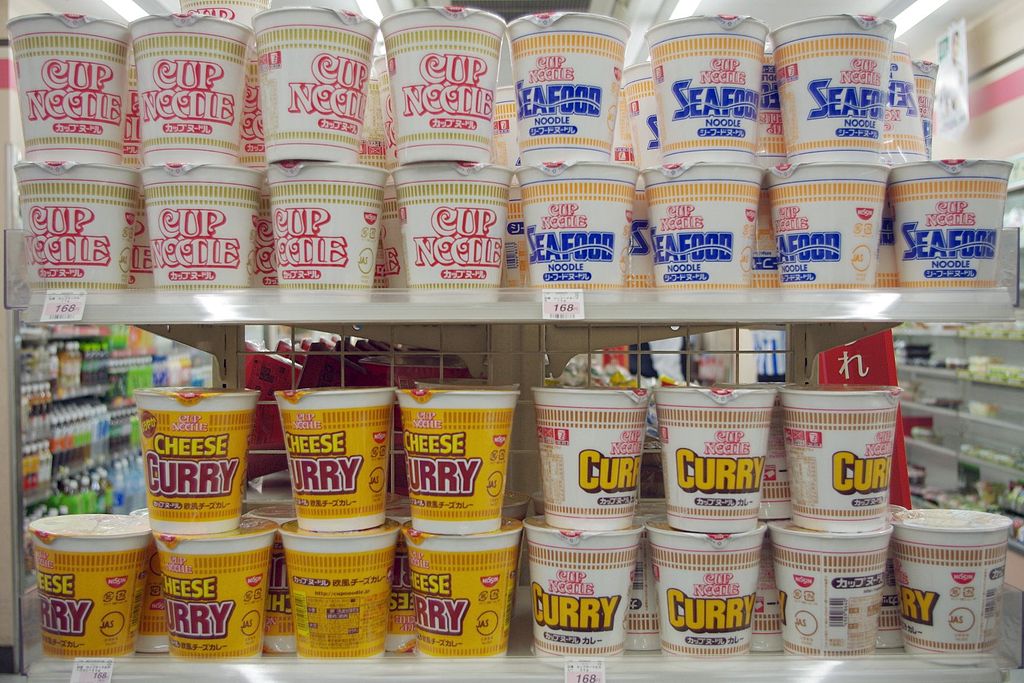
Nissin Cup Noodle. Image by Matt @ PEK from Taipei, Taiwan, CC BY-SA 2.0, via Wikimedia Commons.
Injury
How prevalent are children’s instant soup burns?
Many people are not aware of how dangerous hot liquid can be. Liquids at 140 degrees Fahrenheit—a standard temperature for soup cups—can cause third-degree burns within five seconds of skin contact. These painful injuries can require extensive medical treatment and cause permanent scarring and disability.
Scalds are the most common cause of pediatric burns, accounting for 60 to 80 percent of all hospitalizations. In a 2008 study of caregivers whose children had been burned, the American Burn Association found that 65 percent of scald burn cases they surveyed involved instant soup or noodles. Clinical Pediatrics estimates that 25 children a day suffer burn and scald injuries from dangerous instant soup and noodle cup products. That adds up to about 9,500 children suffering painful injuries every year.
The Journal of Burn Care & Research, the American Burn Association, and other organizations have called for manufacturers to add warnings to their products and develop spill-resistant packaging since at least 2007. But manufacturers continue to sell dangerous instant noodle soup containers that harm thousands of kids every year.
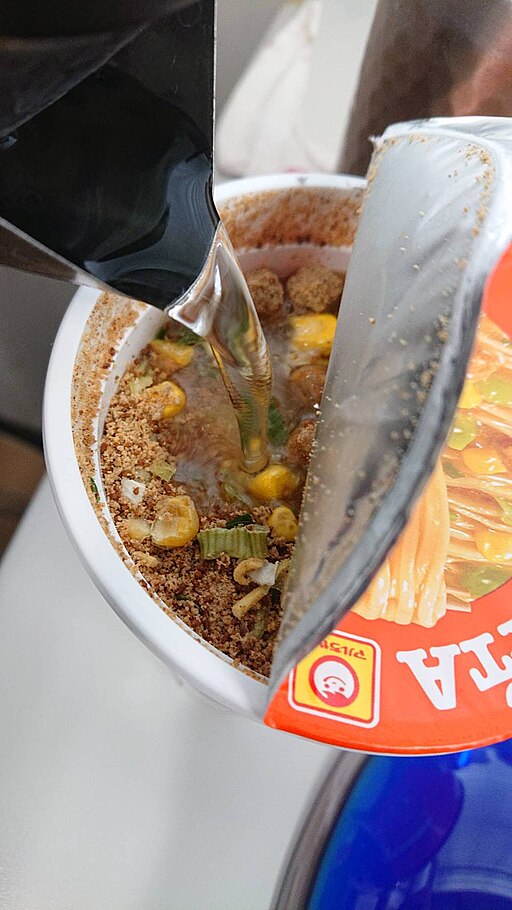
Image by 経済特区, CC BY-SA 4.0, via Wikimedia Commons.
Why are instant soup cups so dangerous?
Because many soup cups are tall with a narrow base and a wider top, they can easily tip over. The flimsy paper or Styrofoam cups can further decrease the stability of the packaging.
A study from the American Burn Association found that some popular brands of cup noodles can tip over at angles as low as 22 degrees. The risk of tipping depends on design—containers that have narrower bases compared to their heights tipped over at lower angles. These less stable containers in turn increase the risk of burn injury.
Simple redesigning for safer packaging could have a major impact on the prevalence of soup-related burns. But despite almost 20 years of scientific studies on the burn risks of these containers, manufacturers continue to sell their products without any changes to design.
What you need to know about childhood scald burns
Scald burns occur when extremely hot liquids are splashed on the skin. They can be caused by hot water, tea, steam, soup, and other liquids. Children are particularly susceptible to serious burns because their skin is thinner and more easily damaged. Scalds are the most common type of burn injury in children under 4.
Burns from boiling water or steam can be the result of split-second accidents and can have lifelong consequences. All hot liquids pose a danger to kids, but sticky noodles and noodle soups are particularly dangerous because they’re designed to hold heat. Due to the nature of spills, scald injuries in children usually occur on the trunk, or the area from the shoulders to groin.
Burn injuries are classified into three categories by severity:
- First-degree burns. These are surface burns and only affect the outer layer of skin. They cause redness, pain, and minor swelling and typically heal within a week.
- Second-degree burns. These are more serious, penetrating past the top layer of skin. They cause intense pain and blistering and can lead to infection and scarring. Second-degree burns may take weeks to heal.
- Third-degree burns. These severe burns destroy all layers of skin and may damage underlying tissue, nerves, and blood vessels. They may require skin grafts and can lead to permanent scarring and disability.
The consequences of severe burns
Burns from an instant noodle soup cup can cause severe pain and lead to hospitalizations and medical care. Burn care is often expensive, with bills for treatment and hospital stays in the thousands or even hundreds of thousands of dollars.
In addition to the immediate harm and cost, severe burns can have long-term emotional and psychological effects including post-traumatic stress disorder (PTSD), anxiety, depression, and issues with body image. Many people who suffer serious burns as children deal with physical and mental consequences for the rest of their lives.
What can you do to protect your kids from instant noodle soup burns?
According to Shriners Hospitals for Children, parents and caretakers can take a few measures to help protect children from soup burns. These include:
- Serving soup warm, not hot.
- Serving in sturdy containers, rather than the provided packaging.
- Avoiding setting hot liquids on tablecloths that children may be able to pull down.
- Supervising young kids making instant noodle soup.
However, even when parents are careful, accidents can still happen. The flawed design of these noodle soup cups increases the likelihood of accidents and injures thousands of children across the U.S. every year. Our firm believes that the manufacturers should be held responsible for their role in severe burns and permanent injuries, and we will work with you to seek compensation.
Plaintiff & Defendant
What you need to know about hot soup burn lawsuits
Wallace Miller is filing personal injury lawsuits against Maruchan, Inc. and Nissin Food Product Co., Ltd., two manufacturers of instant noodle soup cups. Our team of experienced attorneys alleges that the unsafe design of their soup cup products creates a hazard for children.
Despite almost 20 years of research on the dangers of the noodle soup cups’ design, the manufacturers have failed to implement simple packaging changes to prevent children from being burned. They have also failed to warn parents and caregivers about the risk of injury from these products.
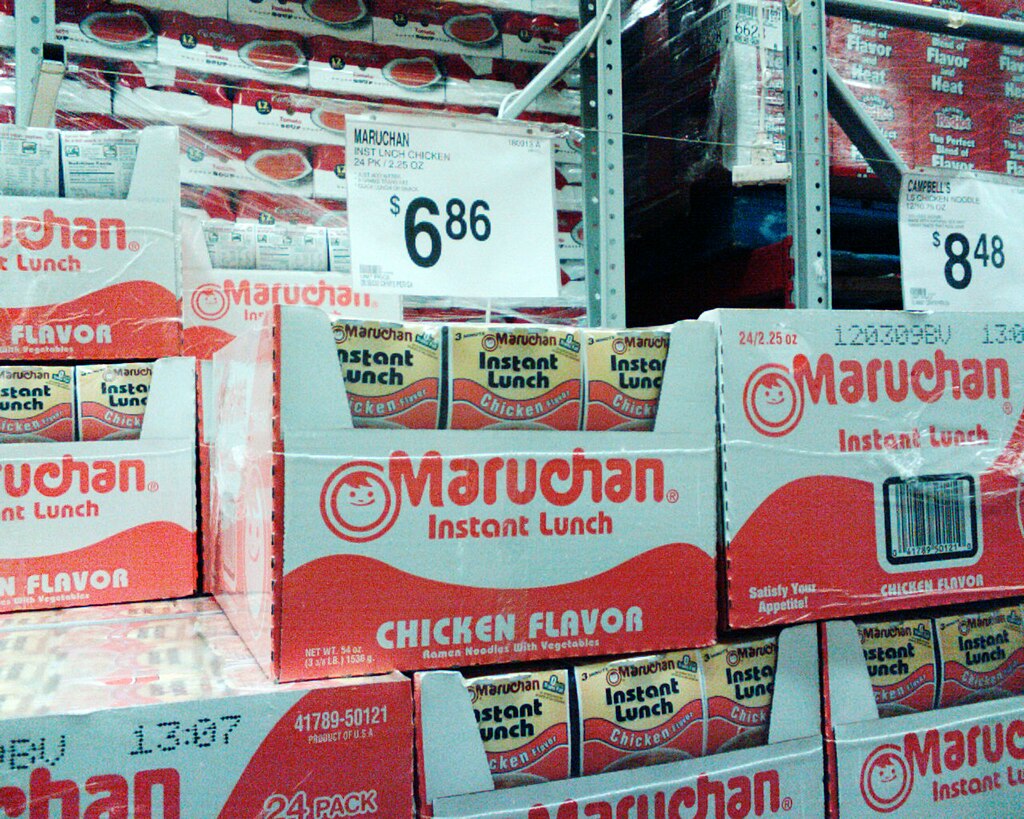
Image by Alison Chan from Flint, MI, USA, CC BY 2.0, via Wikimedia Commons.
Do I qualify for an instant soup burn lawsuit?
If your child or someone you know suffered moderate to severe burns from spilled instant soup, you may be eligible to file an instant noodle soup lawsuit against the manufacturers of the product. In a lawsuit, we work with you to collect evidence to support your case, so it’s important to preserve as much information as you can.
Evidence in a soup lawsuit may include:
- Medical records documenting the extent of the burn injuries.
- Medical records documenting treatment.
- Photographs of your child’s burns throughout the healing process.
- The original soup container or packaging.
- Receipts or proof of purchase for the product.
- Witness statements from anyone who saw the incident.
- Documentation of any related communication with the hospital or other professionals.
Landscape
Damages in an instant cup noodle injury lawsuit
In a civil lawsuit, damages refers to the compensation that plaintiffs receive for the defendants’ wrongdoing. Damages may include:
- Medical bills for emergency treatment, hospital stays, surgery, prescription medication, rehabilitation, and other services.
- Future medical costs for ongoing treatment, including physical therapy, scar revision surgery, and psychological care.
- Lost wages.
- Compensation for pain and suffering.
- Compensation for scarring or permanent visual differences.
If the court finds that manufacturers knowingly ignored safety concerns, it may also award punitive damages. These are an additional form of damages designed to punish the defendant for deliberately harmful conduct.
What is the statute of limitations on instant noodle soup cup lawsuits?
The statute of limitations is the deadline by which someone can file a lawsuit about a specific incident. While it’s typically one to three years from the date of injury, statutes of limitation depend on the state and the circumstances of the alleged wrongdoing.
The statute of limitations is typically paused for minors until they reach the “age of majority” (usually 18) so that they have more time to file. However, determining the exact timeline can be complex. It’s best to reach out to an experienced injury lawyer to go over the details of your potential case, including how long you have to file.
Timeline
December 2025 – Momentum grows in instant soup lawsuits across the country.
Lawsuits against instant soup manufacturers will soon be filed across the United States. Our team is assessing claims and gathering medical records, product data, and other information necessary to build strong cases for our clients.
July 2023 – $300,000 case settled in Long Beach.
The City Council of the City of Long Beach settles a $300,000 case from 2021 in which a child suffered severe burns from instant soup at a summer camp.
January 2021 – Study finds nearly 10,000 children burned each year by instant soup.
A study in Clinical Pediatrics finds that almost 10,000 children a year are burned by instant soup.
2014 – Mother sues Maruchan over burns to one-year-old.
A North Carolina mother sues Maruchan, Inc. over burns to her one-year-old daughter.
2013 – Mother sues Nissin Foods over burns to toddler.
A California mother sues Nissin Foods after burns to her toddler from instant noodle soup.
2008 – An American Burn Association study highlights the dangers of scald burns to kids and calls for manufacturers to change their packaging.
2007 – A study from the American Burn Association finds that scalds are the most common type of pediatric burns and that patients injured by noodle soup have longer hospital stays. It calls for visible warnings on noodle soup containers.
2006 – Another American Burn Association study finds that tall, narrow containers with round bases are significantly more likely to tip over than other types of packaging. The study calls for simple changes to packaging to help keep kids safer.
Contact

Reach out to Wallace Miller for a free consultation
At Wallace Miller, we hold corporations accountable when their careless actions cause harm to children and families. If your child or a loved one has been severely burned by hot water from instant noodle soup, you’re not alone.
Our experienced team of attorneys can help you hold Maruchan or Nissin accountable for their dangerous product. Reach out to our office at (331) 425-8022 or fill out our online case evaluation for a free, no-pressure consultation about your potential case.


